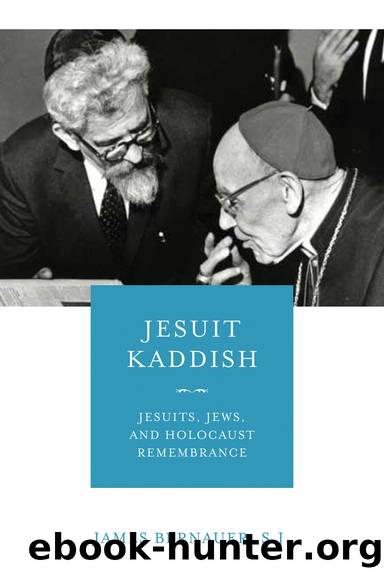Jesuit Kaddish by James Bernauer S.J

Author:James Bernauer, S.J.
Language: eng
Format: epub
Publisher: University of Notre Dame Press
Published: 2020-03-10T00:00:00+00:00
GERMAN JESUIT RESISTANCE
German Jesuits engaged in a wide diversity of activities, and several hundred of them attracted continual harassment from the Nazi authorities. Frequent Gestapo reports on the Jesuits emphasized their influence and the threat their activities posed to the National Socialist regime, especially as a result of their work in the education of the young. Spies regularly attended the sermons of Jesuits and wrote up reports on their frequent denunciations of racial teaching, their criticisms of Hitler, and their spreading of a spirit of defeatism.63 The preachers were regularly brought in for interrogations and, in many cases, for far worse. For example, there is the case of Father Josef Spieker, who was the first Catholic priest to be thrown into a concentration camp and was featured in a study by Eric Johnson.64 Spieker divided his time doing pastoral work between Cologne and Berlin, where he publicly preached against the Nazi regime. Under regular surveillance by the Gestapo, he was arrested and put in a concentration camp, but Spieker did not feel the support of the Church authorities for his anti-Nazi activities. It seems that Father General Wlodimir Ledochowski pleaded to the Nazi government for his release and in a letter of November 7, 1935, promised that the âheads of the Order would take pains to insure that Father Spieker, once he is let go, would be sent out of the country and that outside of Germany he would not involve himself in anti-German activities.â Eventually Spieker was released and assigned to Chile, where he was reprimanded by Society authorities for some of his anti-Nazi lectures there. He was a heroic figure, and Johnsonâs judgment on him poses a question about Jesuit strategy at the time: âFr. Spiekerâs banishment to Chile most likely saved his life, but it was a great loss to Germany.â65
If Spieker was prevailed upon to leave Germany, there were other Jesuits who debated whether to flee but decided to stay. One of these was the aristocrat Georg von Sachsen. In 1936 he wrote to the Jesuit superior general that Nazi propaganda had made Germany a spiritually unhealthy region, but by staying he could witness to Christian values and do some good, including the provision of assistance to Jews in escaping from Germany.66 And then there were Jesuits who fled Germany to save their lives and continue their denunciations of Nazism from abroad. Father Friedrich Muckermann was probably the best-known Jesuit opponent of the Nazis but also a sharp critic of what he regarded as the Churchâs lack of courage in confronting the Hitler government. He challenged the German bishops in 1934: âWhy, the people now ask and the entire world will soon enquire, does the Church not move against the Nazis with the same energy which it found [in its attacks] on the Bolsheviks and Socialists?â67 Forbidden by the Nazis to speak or write publicly, he fled Germany in 1934 and began publishing the anti-Nazi journal Der deutsche Weg while he was in exile. Muckermann died in 1946 in Switzerland.
Download
This site does not store any files on its server. We only index and link to content provided by other sites. Please contact the content providers to delete copyright contents if any and email us, we'll remove relevant links or contents immediately.
The Lost Art of Listening by Michael P. Nichols(6484)
Why I Am Not A Calvinist by Dr. Peter S. Ruckman(3773)
The Rosicrucians by Christopher McIntosh(3058)
Wicca: a guide for the solitary practitioner by Scott Cunningham(2711)
Signature in the Cell: DNA and the Evidence for Intelligent Design by Stephen C. Meyer(2506)
Real Sex by Lauren F. Winner(2481)
The Holy Spirit by Billy Graham(2427)
To Light a Sacred Flame by Silver RavenWolf(2357)
The End of Faith by Sam Harris(2296)
The Gnostic Gospels by Pagels Elaine(2034)
Nine Parts of Desire by Geraldine Brooks(2011)
Waking Up by Sam Harris(1962)
Heavens on Earth by Michael Shermer(1959)
Devil, The by Almond Philip C(1906)
Jesus by Paul Johnson(1892)
The God delusion by Richard Dawkins(1856)
Kundalini by Gopi Krishna(1827)
Chosen by God by R. C. Sproul(1766)
The Nature of Consciousness by Rupert Spira(1692)
